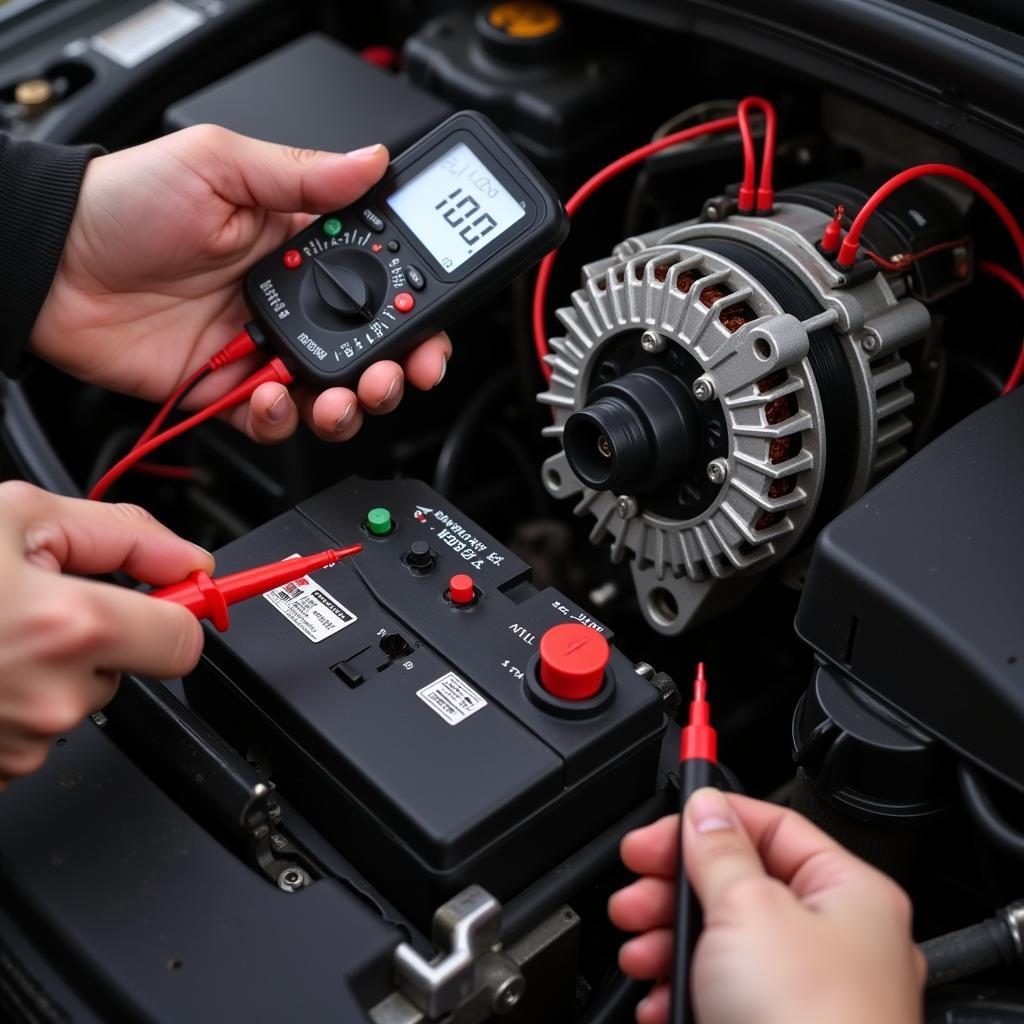Experiencing an Rpm Problem In Car can be frustrating and concerning. Whether your engine revs too high, too low, or fluctuates erratically, this guide will help you understand the potential causes and provide solutions to get your car running smoothly again. We’ll cover everything from simple checks to more complex diagnostic procedures. Let’s dive in!
Understanding RPM and its Importance
RPM stands for revolutions per minute, indicating how fast your engine’s crankshaft is rotating. A stable RPM is crucial for optimal engine performance, fuel efficiency, and overall drivability. Ignoring an rpm problem in car can lead to further damage and costly repairs down the line.
Common Causes of RPM Problems
Several factors can contribute to rpm problems in a car. These range from simple issues like a dirty air filter to more complex problems like a failing sensor.
Vacuum Leaks
A vacuum leak disrupts the precise air-fuel mixture needed for combustion, causing erratic RPM fluctuations. Check hoses and connections for cracks or loose fittings.
Faulty Sensors
Sensors like the Mass Airflow (MAF) sensor, throttle position sensor, or crankshaft position sensor provide vital information to the engine control unit (ECU). A malfunctioning sensor can send incorrect data, leading to rpm issues.
Fuel System Issues
A clogged fuel filter, failing fuel pump, or faulty injectors can restrict fuel flow, causing the engine to struggle and experience RPM drops, especially under load.
Ignition System Problems
Worn spark plugs, faulty ignition coils, or a failing distributor can cause misfires, leading to rough idling and fluctuating RPMs.
car electrical problems at low rpm
Transmission Problems
While less common, issues with the transmission can also manifest as RPM problems, particularly if the car struggles to shift gears or maintain speed.
Diagnosing an RPM Problem
Diagnosing an rpm problem in car often requires a systematic approach. Start with the simplest checks and move on to more complex procedures if necessary.
-
Check the Air Filter: A dirty air filter restricts airflow, potentially causing RPM fluctuations. Replace if necessary.
-
Inspect Vacuum Hoses: Look for cracks, leaks, or loose connections.
-
Scan for Diagnostic Trouble Codes (DTCs): A diagnostic scanner can retrieve codes stored in the ECU, pinpointing the source of the problem.
-
Test Sensors: Use a multimeter or specialized diagnostic tools to test the functionality of relevant sensors.
-
Check Fuel Pressure: Ensure adequate fuel pressure using a fuel pressure gauge.
-
Inspect Ignition System Components: Check spark plugs, ignition coils, and distributor for wear or damage.
Why is my car RPM fluctuating?
Fluctuating RPM can be caused by various factors, including vacuum leaks, faulty sensors, or fuel system issues.
What are the symptoms of a bad RPM sensor?
Symptoms of a bad RPM sensor might include rough idling, stalling, and difficulty starting the engine.
How do I fix my car’s RPM problem?
Fixing an rpm problem in car depends on the underlying cause. Start with simple checks, like inspecting the air filter and vacuum hoses. If the problem persists, consult a qualified mechanic.
“A thorough diagnostic process is key to resolving rpm issues effectively,” says automotive expert, Robert Johnson. “Don’t hesitate to seek professional help if you’re unsure about any step.”
Can a bad battery cause RPM problems?
While less common, a failing battery can sometimes cause electrical instability, potentially leading to RPM fluctuations.
Conclusion
Addressing an rpm problem in car is essential for maintaining optimal vehicle performance and preventing further damage. By understanding the potential causes and utilizing the diagnostic steps outlined in this guide, you can effectively troubleshoot and resolve RPM issues. Remember, seeking professional help is always recommended if you encounter complex problems or are unsure about any repair procedure. Feel free to contact us at AutoTipPro for further assistance. Our phone number is +1 (641) 206-8880, and our office is located at 500 N St Mary’s St, San Antonio, TX 78205, United States. We are always happy to help.
“Regular maintenance is the best way to prevent rpm problems in car and keep your engine running smoothly,” adds Maria Sanchez, a seasoned automotive technician. “Don’t underestimate the importance of routine checks and timely repairs.”
FAQ
-
What is RPM in a car? RPM stands for Revolutions Per Minute and refers to the speed at which the engine’s crankshaft rotates.
-
Can a dirty air filter cause RPM problems? Yes, a restricted airflow due to a dirty air filter can lead to RPM fluctuations.
-
What should I do if my car’s RPM is too high? Check for vacuum leaks, faulty sensors, or issues with the throttle body.
-
How can I check for vacuum leaks? Inspect vacuum hoses for cracks, leaks, or loose connections. You can also use a smoke test to pinpoint leaks.
-
Is it safe to drive with fluctuating RPM? Driving with fluctuating RPM can be unsafe and potentially damage the engine. It’s best to address the issue promptly.
-
How much does it cost to fix an RPM problem? The cost varies depending on the underlying cause and the necessary repairs.
-
Can I fix an RPM problem myself? Simple checks and repairs, like replacing the air filter, can be done DIY. However, complex issues often require professional assistance.





Leave a Reply